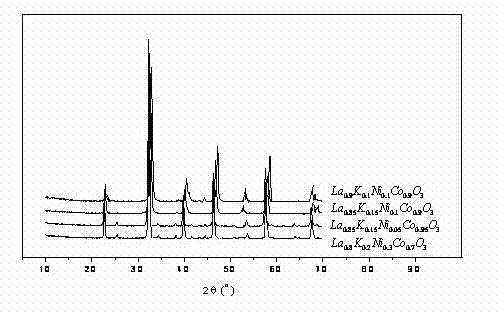Application and preparation of a composite oxide oxygen carrier in chemical chain cycle hydrogen production
An oxygen carrier and oxide technology, applied in the field of chemical chain hydrogen production, can solve the problems of low dispersity of metal oxides, low cyclic reactivity, high reaction temperature, etc., so as to improve the oxygen carrying rate and activity, and prolong the cycle. number of times, the effect of improving oxygen carrying rate and activity
- Summary
- Abstract
- Description
- Claims
- Application Information
AI Technical Summary
Problems solved by technology
Method used
Image
Examples
Embodiment 1
[0017] Take 20.7gCo(NO 3 ) 2 ﹒ 6H 2 O and 2.3gNi(NO 3 ) 2 ﹒ 6H 2 Put O into a 500mL beaker so that the molar ratio of Co to Ni is 0.9 / 0.1, add 100mL of distilled water, then place the beaker in a water bath at 80°C, stir at 400rpm, and stir until completely dissolved. Take 30.87g La(NO 3 ) 3 ﹒ 6H 2 O and 0.8g KNO 3 Put it into a beaker with 100mL of distilled water and stir until it is completely dissolved so that the molar ratio of La to K is 0.9 / 0.1. Then add the lanthanum nitrate and potassium nitrate solutions dropwise to the cobalt nitrate and nickel nitrate solutions, and stir while adding. Take 40g of citric acid, the molar ratio of citric acid to the total amount of metal ions is 1.2:1, put it into a 100mL beaker and stir until it is completely dissolved. At this time, after the above mixed solution is stirred for 30 minutes, slowly add the citric acid solution, while Add dropwise while stirring. After stirring for 5 hours, the brown solution had been deh...
Embodiment 2
[0019] Take 21.85gCo(NO 3 ) 2 ﹒ 6H 2 O and 1.15gNi(NO 3 ) 2 ﹒ 6H 2 Put O into a 500mL beaker so that the molar ratio of Co to Ni is 0.95 / 0.05, add 100mL of distilled water, then place the beaker in a water bath at 80°C, stir at 400rpm, and stir until completely dissolved. Take 29.15g La(NO 3 ) 3 ﹒ 6H 2 O and 1.2g KNO 3Put it into a beaker with 100mL of distilled water, stir until it is completely dissolved, so that the molar ratio of La to K is 0.85 / 0.15. Then add the lanthanum nitrate and potassium nitrate solutions dropwise to the cobalt nitrate solution, and stir while adding. Take 60g of citric acid, the molar ratio of citric acid to metal ions is 1.8:1, put it into a 100mL beaker and stir until it is completely dissolved. At this time, after the above mixed solution is stirred for 30 minutes, slowly add the citric acid solution, while Add dropwise while stirring. After stirring for 5 hours, the brown solution had been dehydrated and turned into a viscous gel...
Embodiment 3
[0021] Take 16.1gCo(NO 3 ) 2 ﹒ 6H 2 O and 6.9gNi(NO 3 ) 2 ﹒ 6H 2 Put O into a 500mL beaker so that the molar ratio of Co to Ni is 0.7 / 0.3, add 100mL of distilled water, then place the beaker in a water bath at 80°C, stir at 400rpm, and stir until completely dissolved. Take 27.44g La(NO 3 ) 3 ﹒ 6H 2 O and 1.6g KNO 3 Put it into a beaker with 100mL of distilled water and stir until it is completely dissolved so that the molar ratio of La to K is 0.8 / 0.2. Then add the lanthanum nitrate and potassium nitrate solutions dropwise to the cobalt nitrate solution, and stir while adding. Take 80g of citric acid, the molar ratio of citric acid to the total amount of metal ions is 2.4:1, put it into a 100mL beaker and stir until it is completely dissolved. At this time, after the above mixed solution is stirred for 30 minutes, slowly add the citric acid solution, while Add dropwise while stirring. After stirring for 5 hours, the brown solution had been dehydrated and turned i...
PUM
| Property | Measurement | Unit |
|---|---|---|
| particle size | aaaaa | aaaaa |
| size | aaaaa | aaaaa |
| size | aaaaa | aaaaa |
Abstract
Description
Claims
Application Information
 Login to View More
Login to View More - R&D
- Intellectual Property
- Life Sciences
- Materials
- Tech Scout
- Unparalleled Data Quality
- Higher Quality Content
- 60% Fewer Hallucinations
Browse by: Latest US Patents, China's latest patents, Technical Efficacy Thesaurus, Application Domain, Technology Topic, Popular Technical Reports.
© 2025 PatSnap. All rights reserved.Legal|Privacy policy|Modern Slavery Act Transparency Statement|Sitemap|About US| Contact US: help@patsnap.com

